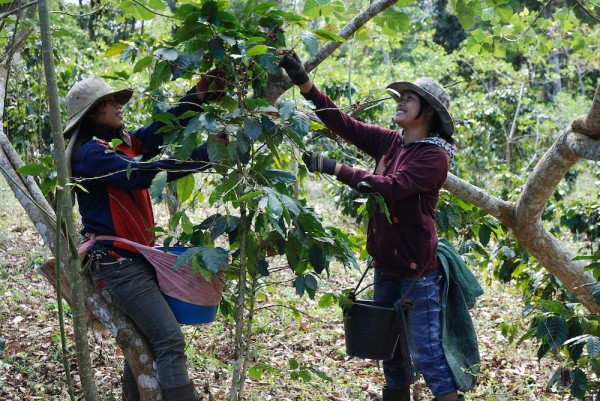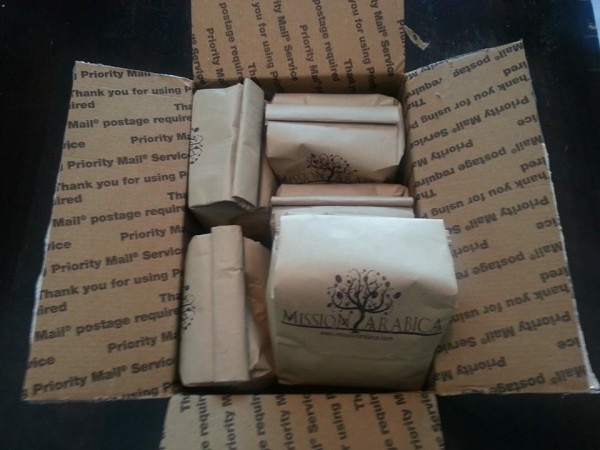Sometimes, the coffee makes the mission. Other times the mission makes the coffee. The latter is the case with Mission Arabica, a collaboration between three longtime friends building a coffee business in its infancy.
Chris Cheney, Gabe Whitner and Adam Holroyd have been known one another for 15-plus years, each working in different industries, none related to coffee. Deciding the need to do something a little more purposeful with their free time, the three recently launched Mission Arabica, a small roastery and online retailer with very big goals to help develop coffee in Laos.
(related: Hate the Game, Not the Players: In Defense of ‘Cause Coffee’)
One of the poorest countries in the world, with a majority of rural families relying on subsistence agriculture, Laos has been trying to revive and build coffee as a cash crop for decades. That said, a number of economic forces — not the least of which being poppy farming for the opium trade and government responses — have prevented the Laotian coffee industry from thriving and finding premium opportunities in the international market.
With a three-phase growth plan being fueled by online coffee sales, Mission Arabica is currently roasting in small batches on a Sonofresco unit in Holroyd’s home Upper Peninsula of Michigan, hoping to build customers and, in the process, build awareness for the potential of coffee farming to help the people of Laos.
We recently reached out to Mission Arabica’s Cheney to ask, why coffee? Why Laos? Why now?
What was the inspiration behind Mission Arabica?
I am a CPA, Gabe is one of the top store managers at a national telecom company, and Adam is self employed and runs a small wireless internet service provider for a few towns up in Wisconsin and the Upper Peninsula of Michigan. That being said, we were all talking one day about how we felt the need to do something greater and more meaningful than the daily routine we felt somewhat stuck in. We decided to start a business together since we were all business minded, but we didn’t just want to start a company to make money — we wanted to start a company that was focused on making a difference.
Where did the association to Laos come from?
We debated doing a lot of different ideas, but we continually came back to thinking about another very close friend of ours named Zach. Zach has been running an English school in Laos for about eight years. When we started researching Laos, we learned that it has historically been very involved in the drug trade through the growing of poppies. However, in attempts to curb the poor reputation the country was getting, the government came in and destroyed many farmers’ fields leaving them without a livelihood. Although I appreciate the attempt to reduce drug production and trafficking, these farmers were not bad people — they were just trying to feed their families. In an attempt to survive, many in Laos have turned to subsistence farming though slash-and-burn agriculture methods, which is terrible for the environment.
Coffee is a much more stable and profitable crop than the upland rice many are currently farming, it is more sustainable for the environment because-slash-and burn methods are not needed year after year, it is already starting to be grown successfully in some regions of Laos, and the northern regions are even over 1,500 meters, which is a great sign for potentially growing specialty coffee there.
You mentioned you’re all new to coffee, so how are you approaching roasting?
It is our goal to always bring out the best qualities of each bean we roast. To accomplish this, we are continually cupping and fine tuning each roast. Additionally, we also regularly reach out to individuals in our network with more experience in the coffee industry who are willing to cup our roasts and provide feedback on how best to fine tune our profiles.
I first had specialty grade coffee less than two years ago and it was an eye-opening experience to realize how good coffee can taste. Our hope for each batch is to be able to provide our customers with that same experience every time they try our coffee, in addition to the realization that every cup is making an important difference in farmers’ lives.
What can you tell us about the three-phase business plan?
We wanted to have a well laid out plan to establish our learning, business, and impact in a form that could be easily followed by our customers. We are very transparent about our progress in reaching our plan goals and provide monthly updates on our site to track this progress regarding growth/loss in social media, web traffic, sales, etc.
With that in mind, phase I is all about learning and building awareness. Since we didn’t know anything about coffee when we first decided to do this in 2013, we spent most of the year planning what we wanted to do, learning about coffee, building a website, setting up the company etc. We also went to Coffee Fest in Chicago, which was awesome and we really learned a ton there. By January 2014 we launched our website and it was just a way to build a following and get people involved while we were still learning. In some ways we were hoping that our lack of knowledge would be turned into a strength because people would be able to follow right along and grow in coffee knowledge with us.
(related: A Tale of Water Disasters, Michael Cera and the Randomness of Barista Life)
Phase II was supposed to actually start the business portion of our company by traveling to Laos, meeting with farmers, purchasing some of the coffee they are currently growing and then selling it to continue to get more ingrained with the business. We originally planned to do this in 2015.
Phase III is to take place in a few years where we would help villages in Laos establish coffee farms. We would provide them the training and up front capital needed to get their farm going and would work with them to continually show them better farming practices. We could purchase part of their crop at fair rates and resell it to help sustain our operations and growth into other villages. Additionally, we would teach them to sell the other part of their crop so they are not fully dependent on us.
An extension of phase III would be to eventually continue this same work in other under privileged areas of the world that are able to produce coffee. This would be several years down the road, though. We are really trying to focus on Laos first.
How much of this do you think can be accomplished without some kind of outside fundraising?
At this time we are not actively pursuing outside funding sources. Although, we would always entertain offers if we felt it would expedite our mission. Once we feel ready to break into phase III and help establish a farm we plan on launching a kickstarter campaign to provide the needed capital.
There are a lot of people selling coffee online, so how will you set yourself apart?
For us this is all about the journey: The journey of three guys determined to do something great; the journey of struggling villages turning into thriving communities; the journey of the readers of our blog and customers growing with us and hopefully even stepping out to take on injustice in the world even when they don’t feel qualified to do so.
Great coffee is pretty much a given, but great coffee with impact and a story — that is really something special and that is what we hope our readers and customers can connect with.
How are you sourcing your Lao coffee now?
We are currently getting our coffee from a farm co-op in Laos called Saffron. Zach knows the owner. This co-op already helps farmers that were impacted by the destruction of their poppy fields.
Nick Brown
Nick Brown is the editor of Daily Coffee News by Roast Magazine.
Comment
2 Comments
Comments are closed.








Hi Nick
you mention in the early part of the article the Laos was looking to “revive” their coffee industry. That implies that they have had a coffee industry in the past? Do you know anything more about that. Perhaps share a link or tow.
Cheers
Hi Steve,
I found an article that discusses the history of the coffee industry and the work that is currently happening in southern Laos:
http://content.time.com/time/world/article/0,8599,2091782,00.html
Although we are happy to work with Lao farmers in the southern regions of the country, we feel that there is a lot of opportunity in northern Laos as well which we are eager to get involved with. The northern villages are more remote, but with higher elivations than those in the south and coffee is currently being grown there in small quanties. If we can help those villages better establish their farms, we believe they have the potential to not only create some world class coffee, but dramatically improve their living conditions.
Let me know of you have any other questions or would like further information.
Kind Regards,
Chris
Mission Arabica